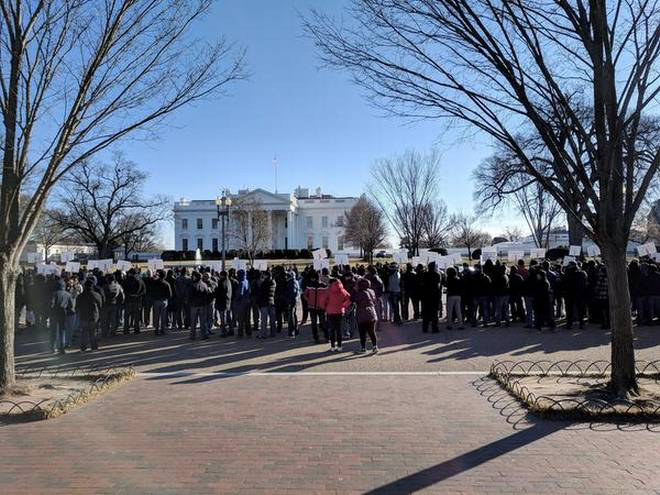
President’s executive order targeting travelers from six Muslim-majority countries and refugees went into partial effect on Thursday, June 29 night.
WASHINGTON (TIP): President Trump’s controversial executive order went into partial effect on Thursday night for the first time since January 2017. The ban imposes broad restrictions on visa travel from six Muslim-majority countries and temporarily suspends U.S. refugee admissions worldwide. But the new barriers already drew legal challenges shortly before going into force.
The Trump administration announced Thursday morning it would begin enforcing the ban at 8 p.m. Eastern Time that night. The move came less than a week after the U.S. Supreme Court narrowed a series of injunctions by lower federal courts blocking the government from imposing the ban’s two key provisions: a 90-day freeze on visa applications from Iran, Libya, Somalia, Sudan, Syria, and Yemen, and a 120-day suspension of the U.S. Refugee Admissions Program.
The Court said Monday that the government can enforce the restrictions on travelers unless they have a “bona fide relationship” with a “person or entity” inside the United States. The justices noted that a family member, employer, or educational institution inside the country would qualify. But they also warned that relationships formed for the purpose of evading the ban would not suffice to gain entry.
“The students from the designated countries who have been admitted to the University of Hawaii have such a relationship with an American entity,” the Court explained in an unsigned order, referring to the lawsuit filed by that institution against the government. “So too would a worker who accepted an offer of employment from an American company or a lecturer invited to address an American audience.”
What will qualify as a “bona fide relationship” in practice is unclear. The State Department, which oversees the visa-application process at embassies and consulates throughout the world, is interpreting the Court’s language narrowly. According to a diplomatic cable obtained by multiple news outlets, applicable relationships will be defined as “a parent (including parent-in-law), spouse, child, adult son or daughter, son-in-law, daughter-in-law, sibling, whether whole or half. This includes step relationships.”
Other family ties will not qualify, even if they fall within what the Court described as a “close familial relationship.” The cable explicitly ruled out entry based on connections inside the United States if those relationships were with “grandparents, grandchildren, aunts, uncles, nieces, nephews, cousins, brothers-in-laws and sisters-in-law, fiancés and any other ‘extended’ family members.”
Shortly before the ban went into effect on Thursday, the state of Hawaii, which filed one of the original lawsuits on behalf of its higher-education system, filed an emergency motion asking a federal district court in Hawaii to clarify the Supreme Court’s order. Among the issues the state asked the court to resolve is whether close family members like grandparents and fiancés fell under the justices’ exception. Neither the court nor the Justice Department has yet responded to the motion.
Human-rights organizations quickly criticized the department’s guidelines as inadequate. “This guidance shows a cruel indifference to families, some already torn apart by war and horrifying levels of violence,” Naureen Shah, a senior director at Amnesty International USA, said in a statement. “It also defines close family relationships in a way that The ACLU, which is among the groups challenging the order at the Supreme Court, suggested the State Department’s interpretation did not conform to the justices’ standard. “The reported guidance does not comport with the Supreme Court’s order, is arbitrary, and is not tied to any legitimate government purpose,” Omar Jadwat, the director of the organization’s Immigrants’ Rights Project, said in a statement.
The Supreme Court’s modifications will remain in force until at least October, when the justices return from their summer recess and hear oral arguments in the case. Because the visa-application freeze is set to last 90 days, it’s possible those restrictions could lapse before the Court has an opportunity to consider them.
Trump claimed victory earlier this week after the Court announced its decision, saying on Twitter that he was “very grateful” for the justices’ move. The president has struggled to implement a version of the ban since he signed its first iteration on January 27. That version went far beyond what the Court sanctioned on Monday, suspending tens of thousands of visas from the six targeted countries and Iraq with virtually no exceptions. ignores the reality in many cultures, where grandparents, cousins, and in-laws are often extremely close.”
(Source: The Atlantic)





Be the first to comment